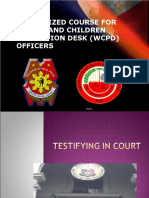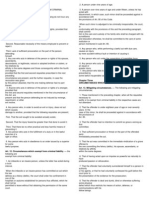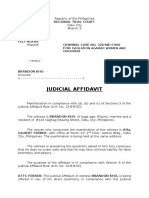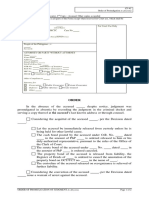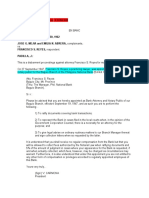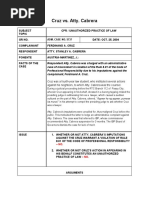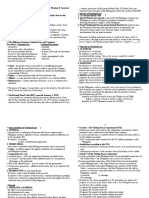Respondent vs. Admonish
Respondent vs. Admonish
Uploaded by
Doo RaCopyright:
Available Formats
Respondent vs. Admonish
Respondent vs. Admonish
Uploaded by
Doo RaCopyright
Available Formats
Share this document
Did you find this document useful?
Is this content inappropriate?
Copyright:
Available Formats
Respondent vs. Admonish
Respondent vs. Admonish
Uploaded by
Doo RaCopyright:
Available Formats
Respondent was
not exonerated by NAPOLCOM but was reprimanded. Can a reprimand then be equated with
exoneration? Or, with "warning" or "admonition", which under the former Revised Civil Service Rules, is not to be
considered a penalty?
A negative answer is called for.
A warning, in ordinary parlance, has been defined as "an act or fact of putting one on his guard against an
impending danger, evil consequences or penalties," while an admonition, "refers to a gentle or friendly reproof, a
mild rebuke, warning or reminder, counselling, on a fault, error or oversight, an expression of authoritative advice
or warning". They are not considered as penalties. A reprimand, on the other hand, is of a more severe nature,
15
and has been defined as a public and formal censure or severe reproof, administered to a person in fault by his
superior officer or a body to which he belongs. It is more than just a warning or an admonition.
16
A reprimand is an administrative penalty although it may be a slight form of penalty. Section 1, Rule VIII of the
Police Manual on the subject of Discipline includes reprimand as a "discipline punishment." It is the last in the
scale of graduated penalties that may be imposed in administrative cases list in Memorandum Circular No. 8,
series of 1970, paragraph II, of the Civil Service Commission under the subject of "Guidelines in the Application
of Penalties in Administrative Cases and Other Matters Relative Thereto." It is a penalty that may be imposed for
a light offense. The same Circular further provides that "the penalty of reprimand must be in writing", and that
17 18
"the penalty of reprimand shall not carry with it any administrative liability." The Civil Service Decree (PD No.
19
807) promulgated on October 6, 1975, also lists reprimand as one of the impossable penalties. In fact,
20
reprimand as provided for in said Circular, has been imposed as a penalty by this Court in Administrative Case
No. P-167, Mendoza vs. Eclavea. 21
The conclusion is inevitable then that since respondent was reprimanded, and reprimand being a penalty, he is
not entitled to his back salaries for the period during which he was under suspension. A suspended member of
the Police force is so entitled only upon exoneration or acquittal.
22
Respondent's argument that he was reprimanded not for the offense of Bribery and Corrupt Practices but merely
for improper conduct in the settlement of a criminal case, hence, he was cleared of any graft or corrupt practices,
is pueril. The act for which he was reprimanded was the same act which gave rise to the charge of Bribery.
While the evidence was insufficient to convict him for the latter offense, his act was nonetheless considered
improper and called for the penalty of reprimand.
You might also like
- LLM SEM 1 CRIMINOLOGY Renaissance UniversityDocument51 pagesLLM SEM 1 CRIMINOLOGY Renaissance Universitykunal mehto100% (1)
- NON PURSUANCE SampleDocument2 pagesNON PURSUANCE SampleencodingjnsNo ratings yet
- Agreement Letter For Storage FeeDocument1 pageAgreement Letter For Storage FeeRob AmpongNo ratings yet
- Affidavit of WitnessDocument1 pageAffidavit of WitnessJonadel Daita GeronaNo ratings yet
- Jurisprudence - Misconduct Mitigating CircumstancesDocument6 pagesJurisprudence - Misconduct Mitigating Circumstancesmanelyn openaNo ratings yet
- SPECIAL POWER OF ATTORNEY - PermitDocument2 pagesSPECIAL POWER OF ATTORNEY - PermitAeris Sycamine Garces AquinoNo ratings yet
- Contract of Services: Part-Time InstructorDocument3 pagesContract of Services: Part-Time InstructorXerries Kaye JumalonNo ratings yet
- Presentation of EvidenceDocument23 pagesPresentation of EvidencerichelovillaruelmesaNo ratings yet
- Writ of AmparoDocument2 pagesWrit of AmparoRaffy Roncales100% (3)
- Entrapment and InstigationDocument4 pagesEntrapment and InstigationSuiNo ratings yet
- Regional Trial Court: - VersusDocument6 pagesRegional Trial Court: - VersusPaulo VillarinNo ratings yet
- A Lecture On WRITSDocument87 pagesA Lecture On WRITSmario100% (1)
- Republic Act No. 10627 or The Anti-Bullying Act of 2013Document2 pagesRepublic Act No. 10627 or The Anti-Bullying Act of 2013annaliezl catibogNo ratings yet
- Rule 111 ReviewerDocument8 pagesRule 111 ReviewerAida PadillaNo ratings yet
- Specialized Course For Women and Children Protection Desk (WCPD) OfficersDocument86 pagesSpecialized Course For Women and Children Protection Desk (WCPD) OfficersDoan BalboaNo ratings yet
- Remedial Law PDFDocument14 pagesRemedial Law PDFThe Supreme Court Public Information Office100% (1)
- Ecclesiastic Minister. - The Penalty of Prision Mayor and A Fine Not ToDocument2 pagesEcclesiastic Minister. - The Penalty of Prision Mayor and A Fine Not ToIlanieMalinisNo ratings yet
- Demurrer LapinaDocument6 pagesDemurrer Lapinajessa M. BontagenNo ratings yet
- Code of Professional ResponsibilityDocument8 pagesCode of Professional ResponsibilityJenniferAlpapara-QuilalaNo ratings yet
- Karichi NotesDocument151 pagesKarichi NotesHeart NuqueNo ratings yet
- Jurisdiction (Answers)Document14 pagesJurisdiction (Answers)Janet Tal-udanNo ratings yet
- Statutory Construction Final Exam QuestionsDocument3 pagesStatutory Construction Final Exam QuestionsartistcnvsNo ratings yet
- RPC Art. 11-15Document2 pagesRPC Art. 11-15bbysheNo ratings yet
- Law Enforcement and Traffic Adjudication SystemDocument6 pagesLaw Enforcement and Traffic Adjudication SystemMa Lorely Liban-CanapiNo ratings yet
- Order: Brian DS Novero Atty. April Pauliene Maligayo Public Prosecutor Public Attorney's OfficeDocument3 pagesOrder: Brian DS Novero Atty. April Pauliene Maligayo Public Prosecutor Public Attorney's OfficeChaddzky BonifacioNo ratings yet
- A.M. No. 03-04-04-SC Custody of Minors & WHC in Relation To ItDocument4 pagesA.M. No. 03-04-04-SC Custody of Minors & WHC in Relation To ItgongsilogNo ratings yet
- OCA Circular No. 201 2022Document2 pagesOCA Circular No. 201 2022JC Amores100% (1)
- COMPLAINT (To PB Pascual-Buenavista)Document5 pagesCOMPLAINT (To PB Pascual-Buenavista)Richard Gomez100% (1)
- SyllabusDocument17 pagesSyllabusfullpizzaNo ratings yet
- Affidavit of Acknowledgment/Paternity: Modesto T. AndongDocument2 pagesAffidavit of Acknowledgment/Paternity: Modesto T. AndongAmanda HernandezNo ratings yet
- Judicial Affidavit: Regional Trial CourtDocument5 pagesJudicial Affidavit: Regional Trial CourtCombat GunneyNo ratings yet
- 15A.1Recognition of Foreign Divorce Decree by Philippine CourtsDocument3 pages15A.1Recognition of Foreign Divorce Decree by Philippine Courtscertiorari19No ratings yet
- Rules On Grant / Revocation of Probation: Non - Institutional CorrectionsDocument11 pagesRules On Grant / Revocation of Probation: Non - Institutional CorrectionsShinya Kogami100% (1)
- Gcta Old & NewDocument8 pagesGcta Old & NewzoweyNo ratings yet
- Exempting Circumstances Gude QuestionsDocument14 pagesExempting Circumstances Gude QuestionsKE NTNo ratings yet
- Family Courts Cases ReferenceDocument42 pagesFamily Courts Cases ReferenceJoel A. YbañezNo ratings yet
- Mediation in Family Courts: BY: Atty. Genevieve Marie Dolores Brandares-PaulinoDocument41 pagesMediation in Family Courts: BY: Atty. Genevieve Marie Dolores Brandares-PaulinoGenevieveMarieDoloresBrandares-paulinoNo ratings yet
- Legal OpinionDocument3 pagesLegal Opinionknicky FranciscoNo ratings yet
- Platon Notes Civil Procedure QuiambaoDocument64 pagesPlaton Notes Civil Procedure QuiambaoYoan Baclig BuenoNo ratings yet
- 2004 Rules On Notarial PracticeDocument5 pages2004 Rules On Notarial PracticeTom HerreraNo ratings yet
- Criminal ProcedureDocument4 pagesCriminal ProcedureMonicaMoscosoNo ratings yet
- DC 020-A Dated 20 July 2023 (TEMPLATE)Document4 pagesDC 020-A Dated 20 July 2023 (TEMPLATE)makicatapang23No ratings yet
- Judicial EthicsDocument4 pagesJudicial EthicsMichael VillameNo ratings yet
- G.R. No. 181626 May 30, 2011 SANTIAGO PAERA, Petitioner, People of The Philippines, RespondentDocument1 pageG.R. No. 181626 May 30, 2011 SANTIAGO PAERA, Petitioner, People of The Philippines, RespondentAnnemargarettejustine CruzNo ratings yet
- Affidavit of DesistanceDocument2 pagesAffidavit of DesistanceThamiya SageNo ratings yet
- NQa Legal Research-Difference-Between-Bench-Warrant-Warrant of Arrest-Alias-WarrantDocument1 pageNQa Legal Research-Difference-Between-Bench-Warrant-Warrant of Arrest-Alias-WarrantThereseNo ratings yet
- People v. CaoiliDocument109 pagesPeople v. CaoilitheagNo ratings yet
- THE LAW PERTAINING TO THE STATE & ITS RELATIONSHIP WITH CITIZENS - AdDU Bar NotesDocument15 pagesTHE LAW PERTAINING TO THE STATE & ITS RELATIONSHIP WITH CITIZENS - AdDU Bar NotesDevilleres Eliza DenNo ratings yet
- Crimes Committed by Public Officers-Part 1Document26 pagesCrimes Committed by Public Officers-Part 1Marites Barrios Taran100% (1)
- Change of Name FinalDocument3 pagesChange of Name FinalKimberley Dela Cruz- MatammuNo ratings yet
- Gregory S. Ong PETITION-IN-INTERVENTIONDocument49 pagesGregory S. Ong PETITION-IN-INTERVENTIONJudge Florentino FloroNo ratings yet
- Affidavit of Confirmation-BlankDocument1 pageAffidavit of Confirmation-BlankMarjorie BetonioNo ratings yet
- Revised Penal Code Memorize ProvisionDocument4 pagesRevised Penal Code Memorize ProvisionSweet Karrah Salazar-CorveraNo ratings yet
- Single Larceny DoctrineDocument14 pagesSingle Larceny DoctrineAngel Urbano100% (2)
- RULE 114 Bail: What Is The Primary Purpose of Bail?Document9 pagesRULE 114 Bail: What Is The Primary Purpose of Bail?salpandita100% (1)
- Rule 110Document20 pagesRule 110Jayemc689No ratings yet
- Affidavit of DesistanceDocument1 pageAffidavit of DesistanceCharmaine DagohoyNo ratings yet
- Order of Promulgation in AbsentiaDocument2 pagesOrder of Promulgation in AbsentiaJorge BiñasNo ratings yet
- Affidavit of Waiver of All Parental Rights, Relinquishment of Child, and Consent To AdoptionDocument4 pagesAffidavit of Waiver of All Parental Rights, Relinquishment of Child, and Consent To AdoptionGRACE100% (1)
- Consti2 2023-2024 2nd Sem Syllabus AUSLDocument20 pagesConsti2 2023-2024 2nd Sem Syllabus AUSLDanielle AmbrocioNo ratings yet
- Civil Liability Arising From CrimeDocument2 pagesCivil Liability Arising From CrimeYNNA DERAYNo ratings yet
- Mejia vs. Reyes, 4 SCRA 648Document3 pagesMejia vs. Reyes, 4 SCRA 648Doo RaNo ratings yet
- People vs. Malunsing 63 SCRA 493Document3 pagesPeople vs. Malunsing 63 SCRA 493Doo RaNo ratings yet
- Legarda vs. CA, G.R. No. 994457 March 18, 1991Document6 pagesLegarda vs. CA, G.R. No. 994457 March 18, 1991Doo RaNo ratings yet
- Flores vs. Zurbito, 37 Phil 746Document3 pagesFlores vs. Zurbito, 37 Phil 746Doo RaNo ratings yet
- Santiago vs. Fojas 248 SCRA 68Document5 pagesSantiago vs. Fojas 248 SCRA 68Doo RaNo ratings yet
- Management of Kidnapping IncidentDocument11 pagesManagement of Kidnapping IncidentDoo Ra100% (1)
- DuranDocument35 pagesDuranDoo RaNo ratings yet
- Idiot ChartDocument8 pagesIdiot ChartDoo RaNo ratings yet
- Art, 8, 9 and 10 ReadingsDocument47 pagesArt, 8, 9 and 10 ReadingsDoo RaNo ratings yet
- Report ScriptDocument3 pagesReport ScriptDoo RaNo ratings yet
- PAFLU vs. Binalbagan Isabela Sugar Case DigestDocument2 pagesPAFLU vs. Binalbagan Isabela Sugar Case DigestDoo RaNo ratings yet
- Powerpoint Labelling TheoryDocument13 pagesPowerpoint Labelling TheoryDoo RaNo ratings yet
- Canon 1 - 6 CaseDocument90 pagesCanon 1 - 6 CaseDoo RaNo ratings yet
- Criminal Law Art. 13 and 14Document37 pagesCriminal Law Art. 13 and 14Doo RaNo ratings yet
- Hierarchy of CourtsDocument12 pagesHierarchy of CourtsDoo RaNo ratings yet
- Cruz vs. Atty. Cabrera Case DigestDocument3 pagesCruz vs. Atty. Cabrera Case DigestDoo RaNo ratings yet
- Amurao NotesDocument56 pagesAmurao NotesDoo Ra100% (1)
- FegbgfbDocument7 pagesFegbgfbDoo RaNo ratings yet
- LEBMC 57 Law School Admission Guidelines AY20!21!1Document2 pagesLEBMC 57 Law School Admission Guidelines AY20!21!1Doo RaNo ratings yet
- Conversions: ROM Ercent TO EcimalDocument3 pagesConversions: ROM Ercent TO EcimalDoo RaNo ratings yet
- FractionDocument3 pagesFractionDoo RaNo ratings yet
- Memo ESTAFADocument11 pagesMemo ESTAFANaim SubaNo ratings yet
- Elizabeth Kafupa Vs Sixtus Kafupa (Misc Land Appeal No 6 of 2021) 2022 TZHC 10682 (20 July 2022)Document10 pagesElizabeth Kafupa Vs Sixtus Kafupa (Misc Land Appeal No 6 of 2021) 2022 TZHC 10682 (20 July 2022)Hossea MangulaNo ratings yet
- Bill of Rights D 4thDocument109 pagesBill of Rights D 4thDevilleres Eliza DenNo ratings yet
- Module 4 Legal, Ethical, and Professional Issues in Information SecurityDocument27 pagesModule 4 Legal, Ethical, and Professional Issues in Information Securityjosh melchorNo ratings yet
- Public Law IDocument39 pagesPublic Law Isanalee fentonNo ratings yet
- Domestic Violence Against MenDocument5 pagesDomestic Violence Against MenAdministrador de sitioNo ratings yet
- Ra NDT InspectionDocument3 pagesRa NDT InspectionChe Wan ErliyasNo ratings yet
- Defenses in TortDocument10 pagesDefenses in TortZaitoon ButtNo ratings yet
- Effects of The - War On Drugs - On Human Rights in The PhilippinesDocument9 pagesEffects of The - War On Drugs - On Human Rights in The PhilippinesJhay AlkuinoNo ratings yet
- The HCCH Conventions and Their Practical Effects To Private International Law in The PhilippinesDocument374 pagesThe HCCH Conventions and Their Practical Effects To Private International Law in The PhilippinesBien Garcia IIINo ratings yet
- Valeroso v. PeopleDocument1 pageValeroso v. PeopleRukmini Dasi Rosemary GuevaraNo ratings yet
- People Vs Araneta DigestDocument2 pagesPeople Vs Araneta DigestRussell John S. Hipolito100% (1)
- Pratyush Pandey, Land Laws, Sem 8, Roll 103, Sec BDocument8 pagesPratyush Pandey, Land Laws, Sem 8, Roll 103, Sec BPratyush PandeyNo ratings yet
- Adithyan Bail OrderDocument3 pagesAdithyan Bail OrderjadeassociatesekmNo ratings yet
- Misamis University: Second Semester SY: 2021-2022Document5 pagesMisamis University: Second Semester SY: 2021-2022Empowered ConsumerismNo ratings yet
- Public Interest LitigationDocument3 pagesPublic Interest LitigationChinta PereraNo ratings yet
- CV - Chairunnas - M.osh For HSE ManagerDocument6 pagesCV - Chairunnas - M.osh For HSE ManagerOka WansyahNo ratings yet
- Ruffy v. Chief of Staff (G.R. No. L-533, August 20, 1946)Document4 pagesRuffy v. Chief of Staff (G.R. No. L-533, August 20, 1946)R6COVIDLOGISTICS RESPONSE TEAMNo ratings yet
- WCME-I-06 Corporate Social Responsibility (Labour) - ProcurementDocument2 pagesWCME-I-06 Corporate Social Responsibility (Labour) - ProcurementabdullaNo ratings yet
- 20 DR - Manuel Golloso CoDocument24 pages20 DR - Manuel Golloso CoTony TopacioNo ratings yet
- Safety Week Planner - 2022Document6 pagesSafety Week Planner - 2022Rahul KrishnanNo ratings yet
- Olaniyan OnaDocument2 pagesOlaniyan OnaJoellNo ratings yet
- Final DemoDocument47 pagesFinal DemoSean Paul Jimenez100% (1)
- Insurance Law NOV 2023 - MDU LLB Exam Question Paper 9653Document2 pagesInsurance Law NOV 2023 - MDU LLB Exam Question Paper 9653AJAY GUPTANo ratings yet
- The State of Tamil Nadu Vs Vaidyanatha Sastri Alias On 18 July 2018Document14 pagesThe State of Tamil Nadu Vs Vaidyanatha Sastri Alias On 18 July 2018naveen kumar duraisamyNo ratings yet
- List of CIPPE SyllabusDocument5 pagesList of CIPPE SyllabusraotejasvinNo ratings yet
- Pol Plan ADSU - LowDocument2 pagesPol Plan ADSU - LowkabirNo ratings yet
- International Law 5th ed Edition Malcolm N. Shaw download pdfDocument51 pagesInternational Law 5th ed Edition Malcolm N. Shaw download pdflentiishelsy100% (4)
- Concept of Right and DutyDocument12 pagesConcept of Right and DutyNitukaur SonteNo ratings yet














